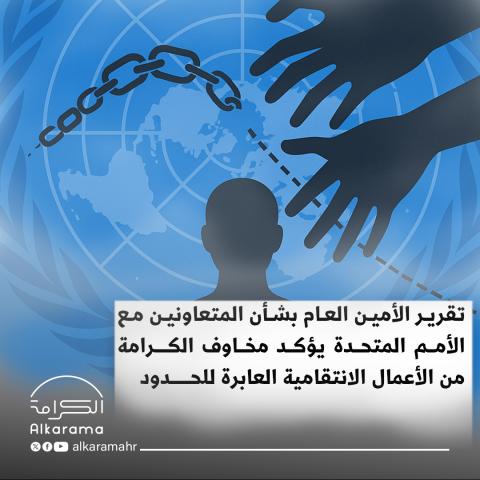
The annual report of the United Nations Secretary-General on intimidation and reprisals against individuals cooperating with the UN, recently released, has confirmed Alkarama’s observations regarding the growing trend of transnational repression and reprisals targeting organizations and individuals in exile or residing in third countries due to their collaboration with the United Nations. These practices are described as a systematic method employed by certain States to silence their opponents.
The report notes that transnational persecution whether in the form of fabricated criminal charges related to security and terrorism, electronic surveillance, refusal to renew passports, harassment, direct threats against relatives or attempts to extradite or forcibly return recognized refugees undermines the very essence of cooperation with the United Nations. Such practices have a chilling effect, discouraging victims and human rights defenders from engaging with international mechanisms.
Acts of Reprisal
In its latest submission, Alkarama drew attention to the gravity of these transnational threats, expressing deep concern over the alarming increase in acts of reprisal targeting the families of Arab citizens living in exile, particularly in Europe and North America.
It further noted that these forms of transnational coercion increasingly discourage such families from collaborating with civil society organizations, due to credible threats of intimidation and reprisals against their relatives remaining in their countries of origin.
Alkarama affirmed that this transnational repressive model gravely undermines the integrity and effectiveness of the UN human rights system, which fundamentally depends on the free, voluntary and secure participation of victims and their representatives.
Consequently, Alkarama called on the international community to establish robust and legally binding protection mechanisms to safeguard the families of victims in exile, who often play a key intermediary role between civil society and international human rights mechanisms.
In his latest annual report, the Secretary-General also recalled several cases previously mentioned in earlier reports submitted by Alkarama either as part of its contributions to the annual report on acts of reprisal or in complaints addressed to special procedures. Among these cases are those of Saudi academic Mohammed bin Fahd al-Qahtani and lawyer Issa al-Nukhaifi, both released earlier this year, as well as those of Egyptian lawyer Ibrahim Abdelmoneim Metwally Hegazy, Emirati lawyer Ahmed Mansoor and Lebanese citizen Ahmad Ali Mekkaoui in the United Arab Emirates, among others.
Alkarama’s Contribution
On 15 April 2025, Alkarama submitted its contribution to the UN Secretary-General’s report on acts of reprisal against individuals and entities cooperating with UN human rights mechanisms. This report, prepared in accordance with Human Rights Council Resolution 12/2, aims to document acts of intimidation or reprisals against those who engage with the UN to promote international human rights standards.
In keeping with its unwavering commitment to the defense of fundamental freedoms, Alkarama this year highlighted two emblematic cases illustrating the scale and severity of acts of reprisal: that of Moroccan environmental activist Mohamed Attaoui, and that of Saudi thinker Safar al-Hawali, who has been arbitrarily detained for many years. These two cases exemplify the significant risks faced by those who dare to assert their rights on the international stage.
